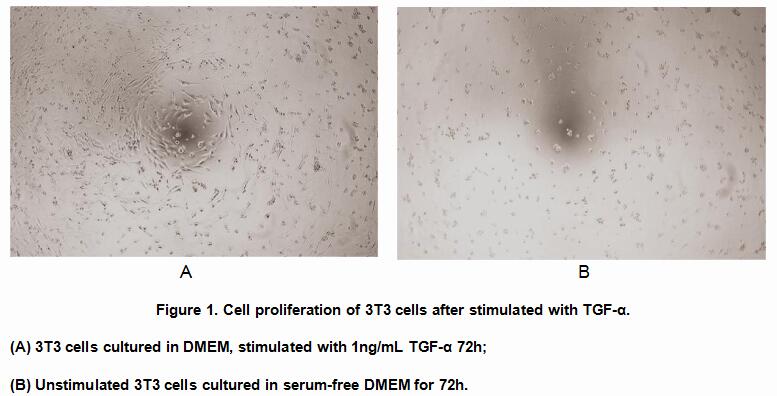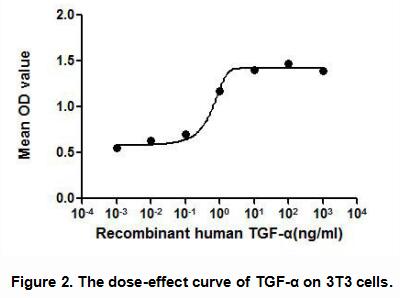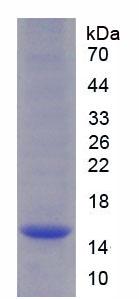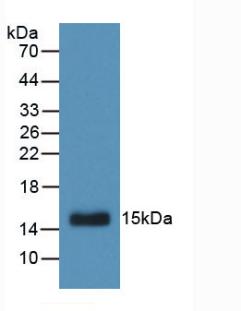Active Transforming Growth Factor Alpha (TGFa) 

ETGF; TGF-A; Protransforming Growth Factor alpha; EGF-Like TGF
Overview
Properties
- Product No.APA123Hu01
- Organism SpeciesHomo sapiens (Human) Same name, Different species.
- ApplicationsCell culture; Activity Assays.
Research use only - DownloadInstruction Manual
- CategoryCytokineTumor immunityInfection immunity
- Buffer Formulation20mM Tris, 150mM NaCl, pH8.0, containing 1mM EDTA, 1mM DTT, 0.01% SKL, 5% Trehalose and Proclin300.
- Traits Freeze-dried powder, Purity > 97%
- Isoelectric Point6.6
Sign into your account
Share a new citation as an author
Upload your experimental result
Review

Contact us
Please fill in the blank.
Activity test

Transforming growth factor alpha (TGF-α), a ligand for the epidermal growth factor receptor, which activates a signaling pathway for cell proliferation, differentiation and development. To test the effect of TGF-α on cell proliferation of 3T3 fibroblasts, 3T3 cells were seeded into triplicate wells of 96-well plates at a density of 2, 000 cells/well and allowed to attach overnight, then the medium was replaced with serum-free standard DMEM prior to the addition of various concentrations of TGF-α. After incubated for 72h, cells were observed by inverted microscope and cell proliferation was measured by Cell Counting Kit-8 (CCK-8). Briefly, 10µL of CCK-8 solution was added to each well of the plate, then measure the absorbance at 450nm using a microplate reader after incubating the plate for 1-4 hours at 37°C.
Cell proliferation of 3T3 cells after incubation with TGF-α for 72h observed by inverted microscope was shown in Figure 1.

The dose-effect curve of TGF-α was shown in Figure 2. It was obvious that TGF-α significantly promoted cell proliferation of 3T3 cells. The ED50 for this effect is typically 0.6198 to 8.210ng/mL.
Usage
Reconstitute in 20mM Tris, 150mM NaCl (pH8.0) to a concentration of 0.1-1.0 mg/mL. Do not vortex.
Storage
Avoid repeated freeze/thaw cycles. Store at 2-8°C for one month. Aliquot and store at -80°C for 12 months.
Stability
The thermal stability is described by the loss rate. The loss rate was determined by accelerated thermal degradation test, that is, incubate the protein at 37°C for 48h, and no obvious degradation and precipitation were observed. The loss rate is less than 5% within the expiration date under appropriate storage condition.
Increment services
-
 BCA Protein Quantification Kit
BCA Protein Quantification Kit
-
 Molecular Mass Marker for Protein
Molecular Mass Marker for Protein
-
 Monoclonal Antibody Customized Service
Monoclonal Antibody Customized Service
-
 Polyclonal Antibody Customized Service
Polyclonal Antibody Customized Service
-
 Protein Activity Test Experiment Service
Protein Activity Test Experiment Service
-
 Electrophoretic Mobility Shift Assay (EMSA) Experiment Service
Electrophoretic Mobility Shift Assay (EMSA) Experiment Service
-
 Buffer
Buffer
-
 Lentivirus Packaging Experiment Service
Lentivirus Packaging Experiment Service
-
 Adenovirus Packaging Experiment Service
Adenovirus Packaging Experiment Service
-
 Real Time PCR Experimental Service
Real Time PCR Experimental Service
-
 Spike RBD Protein (S-RBD)
Spike RBD Protein (S-RBD)
-
 Protein G
Protein G
-
 Protein A
Protein A
Citations
- Protective effects of curcumin, α-lipoic acid, and N-acetylcysteine against carbon tetrachloride-induced liver fibrosis in ratsSpringerLink: h875w73171w2147w
- A bone-seeking clone exhibits different biological properties from the ACHN parental human renal cell carcinoma in vivo and in vitroPubMed: PMC3583590
- The effects of particulate matter on inflammation of respiratory system: Differences betweenmale and female.pubmed:28174048
- CD9 regulates keratinocyte migration by negatively modulating the sheddase activity of ADAM17
- Polarization of ADAM17‐driven EGFR signalling in electric field‐guided collective migration of epidermal sheetsPubmed: 33164313
- Toll-like receptor 5-mediated signaling enhances liver regeneration in mice









